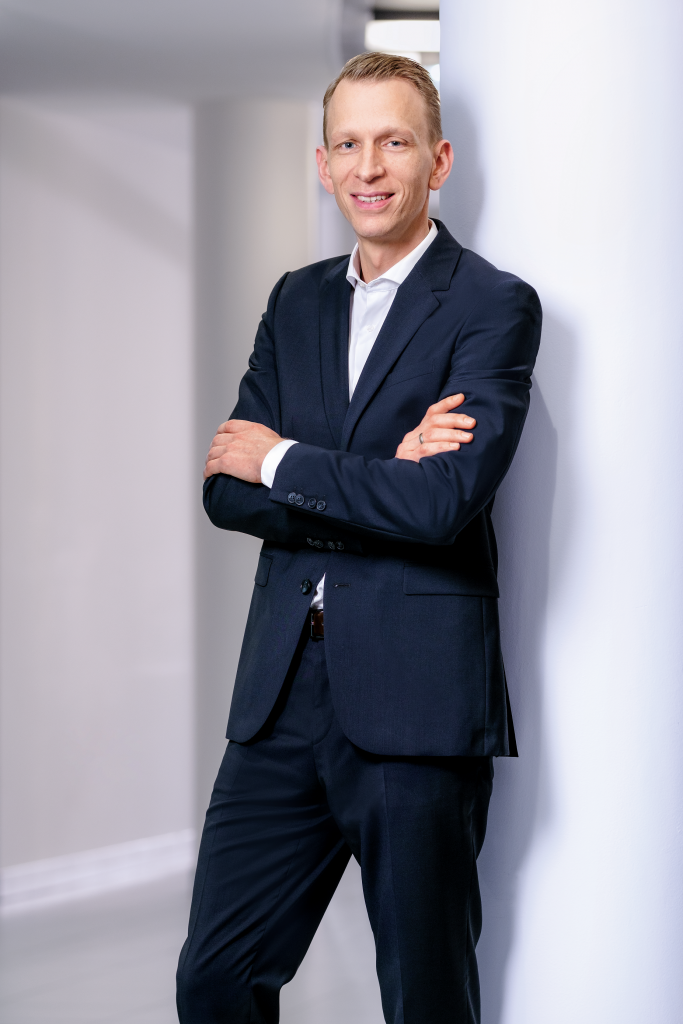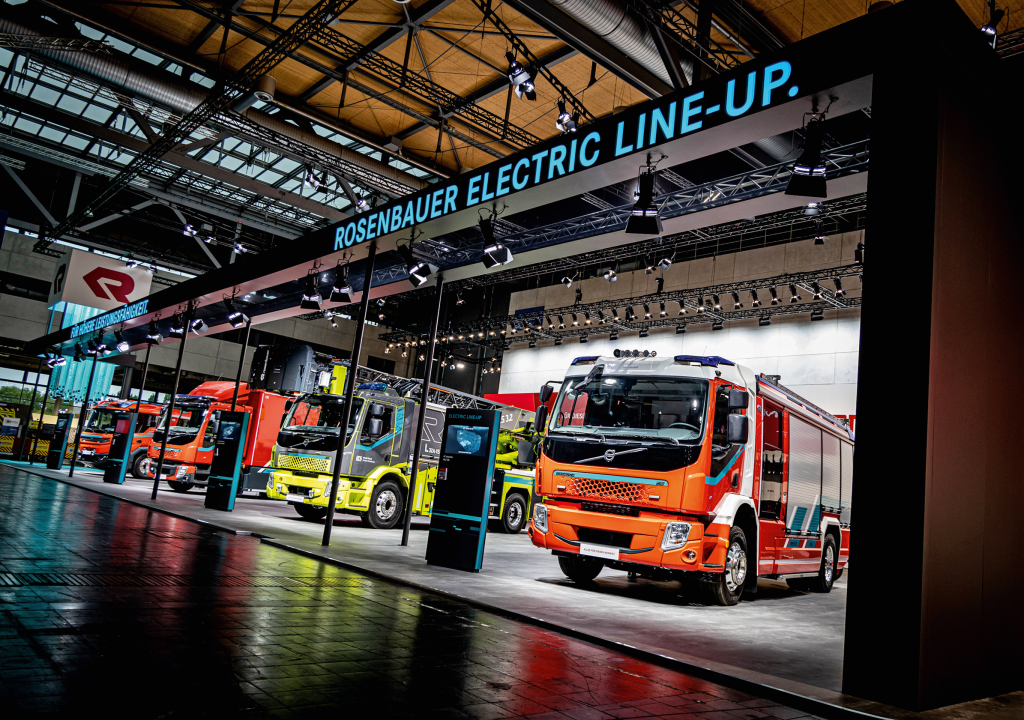Electrification has reached heavy vehicles: The Rosenbauer Group is building “Revolutionary Technology”.
The Upper Austrian Rosenbauer Group has been one of the world’s leading fire service suppliers for decades. Constant innovation is one of the secrets of the company’s success, which develops and produces vehicles, extinguishing technology, equipment and digital solutions for professional, company, works and voluntary fire brigades, as well as systems for preventive fire protection. Products from European, US and Asian production cover all important standards. With a turnover of 972.2 million euros, around 4,100 employees (as of 2022) and a sales and service network in about 120 countries, the group is the largest fire equipment supplier in the world. The listed family business is run by the sixth generation and has been serving fire services for more than 150 years. CEO Sebastian Wolf on the electrification of firefighting vehicles, future challenges and a massive cyberattack that affected the company in spring 2023.

Rosenbauer International AG.
© Rosenbauer
The Rosenbauer company has been around for more than 150
years. What are the ‘main ingredients’ that have made Rosenbauer
a successful international group?
Sebastian Wolf: Recognising trends at an early stage and transforming
them into real products is clearly one of our strengths.
For example, back in 2016, at our 150th anniversary celebrations,
we presented the Concept Fire Truck, a fire truck with a fully
electric drive. This evolved into the RT (Revolutionary Technology),
which went into test operation with selected customers in
2020. Since May 2023, we have been producing the RT in series
and are supplying customers in Europe, the US, Australia and
Canada. At the ‘Interschutz’ trade fair in June 2022, we were the
only manufacturer to present a complete, fully electric line-up of
emergency vehicles for the municipal sector: In addition to our
RT, municipal fire-fighting vehicles, turntable ladders and logistics
vehicles on electric truck chassis, we also presented the first
prototype of our airport fire-fighting vehicle, the Panther electric.
Emergency vehicles with alternative drives will play an important
role in the years to come because they make a valuable
contribution to cities and municipalities achieving their climate
targets.
You have production facilities in Europe, the US and Asia.
Which of the locations is particularly important and why?
Wolf: The locations have been chosen so that we can operate close
to the customer, keep delivery routes short and contribute to the
value creation of the respective countries. By producing at different
locations, we also cover the required standards. A vehicle for the
European market is subject to completely different specifications
than a vehicle that is put into service in America or Asia. In addition
to production in Europe, North America – one of the largest single
markets for fire fighting vehicles – is one of our most important sales
regions; accordingly, we also pay great attention to the expansion
of our dealer and service network.
Despite its international orientation, the head office is in Austria.
What advantages does this location offer you?
Wolf: The headquarters in Leonding near Linz is our largest production
site. Among other things, our highest-volume municipal
vehicle, the AT (NB: Advanced Technology), the Panther, an airport
fire-fighting vehicle and the fire-fighting components for the entire
group are manufactured here. The majority of our product development
is also based in Leonding. It is important for us to create as
much value as possible in our own country. In addition, the domestic
labour market also offers us the qualifications we need in our
demanding business.

© Rosenbauer
Your company was the target of a cyberattack at the end of
February. What damage did that cause and what consequences
will you draw from it?
Wolf: The question today is not whether you are attacked, but
when. We were well prepared, and our IT team reacted quickly and
took all servers offline as an immediate measure. After that, the
team started a controlled recovery process.
Within a very short time, around 300 servers and
more than 3,000 notebooks were reset, and the
IT systems were gradually brought back online
with a focus on production and logistics. Nevertheless,
production at the Leonding site was
disrupted for about two weeks, while other sites
such as America or Spain were able to continue
production. We assume that the economic damage
was in the low, single-digit million euros
range. The damage assessment could not be
completed for a long time and took many weeks. The attack clearly
showed how important it is to have a well-established recovery
process and to sensitise employees to the issue. As a consequence,
we have significantly tightened our security precautions throughout
the Group.
Cyberattacks are just one challenge in these turbulent times.
How much are you affected by the rise in energy prices and supply
chain problems – such as those caused by the war in Ukraine?
Wolf: Since our energy costs account for less
than one percent of our turnover, we are hardly
affected directly by the rise in energy prices.
However, we are very strongly affected by energy
price-induced inflation via the supply chain.
For example, aluminium sheet, which is important
for us, has become 37 percent more expensive
in 2022 compared to 2021. Despite increasing
rays of hope, the supply chains are still very
fragile and react highly sensitively to the slightest
change. Longer delivery times for many large
components, especially for the important chassis, have become the
‘new normal’ for us and we are adjusting our processes to accommodate
this.
Do you notice any problems in recruiting new skilled workers
and what measures are you taking to have enough skilled staff
available in the future?
Wolf: The shortage of skilled staff now affects all industries, and
increasingly it is not just skilled workers who are lacking – there is
a general shortage of labour. At Rosenbauer, training apprentices
is therefore a very high priority. We train around 100 apprentices,
and it is particularly pleasing that there are also more and more
girls. In September 2022, for example, 32 new apprentices started
their training at the Leonding and Neidling sites, and a quarter of
them were young women. Through our initiative women@rosenbauer.
com, we are also trying to specifically recruit women for
Rosenbauer, because we want to increase the share of women in
our workforce to 15 percent by 2025; it is currently around 13.5
percent across the Group.

© Rosenbauer
Speaking of sustainability and circular economy – what steps
is Rosenbauer currently taking to produce in a greener or more
sustainable way?
Wolf: In 2022, as part of our long-term Group strategy ‘Rosenbauer
City 2030’, we drew up a climate strategy based on the specifications
of the ‘Science Based Targets’ initiative and submitted it for
evaluation. For this purpose, a comprehensive greenhouse gas inventory
was carried out for the first time and both direct and indirect
CO2 emissions were determined. This showed us that as an
“I would like to see
politicians promote
alternative drive
systems equally in
all areas.”
Sebastian Wo l f
The Rosenbauer site in Leonding with its own PV system
assembler we only cause a very small part of the emissions attributable
to us. The majority comes from indirect emissions through
the use of our vehicles.
We have set ourselves the goal of reducing our direct emissions
by 46.2 percent and our indirect emissions by 27.5 percent by 2030
compared to 2019. On the way to achieving this goal, we are focusing
on our own programme for greater energy efficiency and on
alternative vehicle drives, in addition to other measures.
What challenges does your company face in the coming months?
Wolf: Our customers are almost exclusively from the public sector.
They are used to concluding fixed-price contracts through tenders.
We have to convince our customers of indexed contracts and at the
same time reduce our manufacturing costs to counteract inflation.
This is hitting us particularly hard, as breached delivery times have
led to longer lead times. After a difficult year in 2022, we have set
ourselves the goal of achieving sales of over one billion euros in
2023 and a clearly positive result again with an EBIT margin of
three percent. To achieve this, we already initiated a programme to
reduce manufacturing costs and adjust our pricing policy in late
summer 2022.
What measures would you like to see from politicians to make
Austria more attractive as a business location? Or is it all bliss?
Wolf: What I would like to see from politics is that alternative drives
are really promoted equally in all areas. Because we notice again
and again that the special needs of the fire brigades are not adequately
reflected in the funding guidelines. With adapted criteria,
we could quickly create the basis for a shift in mobility towards
electric vehicles. Our vehicles in particular are often in use for 20
years or more – which means, on the one hand, that they are very
durable, and on the other hand, we would have to execute a technology
change today in order to achieve the Paris climate
goals in 2030.